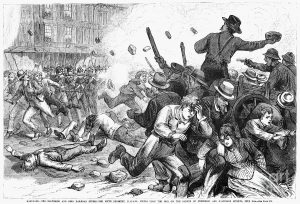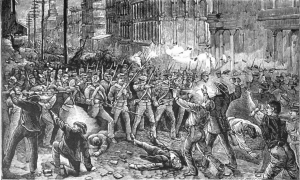An Heiress on the Run and the Strike that Derailed Her Getaway
In the summer of 1877, when my heiress, Caroline Wilkins, flees her home to escape her lecherous fiancee, the U.S. is in an economic depression. As Caroline’s train approaches Baltimore, striking workers for the Baltimore & Ohio Railroad block the tracks preventing her train from reaching Camden Station. She is forced to deboard and finds herself swept up in a protest that suddenly turns violent when the demonstrators set the train she’d been riding ablaze.
The Great Railroad Strike began four days earlier in Martinsburg, WV when workers for B&O protested the second wage cut by the company in 8 months by decoupling trains and holding them hostage in the roundhouse. Employees earning more than a dollar a day would get a 10% pay cut and go from working three days/week to two days while dividend holders received a 10% increase in profits. Violence quickly spread along the rail lines to Hagerstown & Baltimore, MD then on to Scranton & Pittsburgh, PA and the Pennsylvania Railroad. Eventually the strike spread as far away as Chicago and St. Louis. The strike disrupted service in many small substations as well.
Manufacturers, sawyers, tin makers, and box-makers also walked off the job demanding better working conditions and pay increases. Business all over the city was effected. President Hayes ordered Federal troops to respond to the protest in Baltimore and the mayor raised 500 volunteers to assist police in quelling the riots. At one point the rioters had Records area bit fuzzy, but my research shows between 10 and 22 were killed, more than 150 were injured, and many more were arrested.

Negotiations between the strikers and the B&O Railroad were ultimately unsuccessful. Many employees quit rather than return to their jobs at reduced wages. Under the supervision of police and military, normal rail traffic resumed on July 29.
To learn more, view these short videos I discovered as part of my research:
The Great Railroad Strike of 1877
Camden Station, Baltimore, & The Great Railroad Strike of 1877



